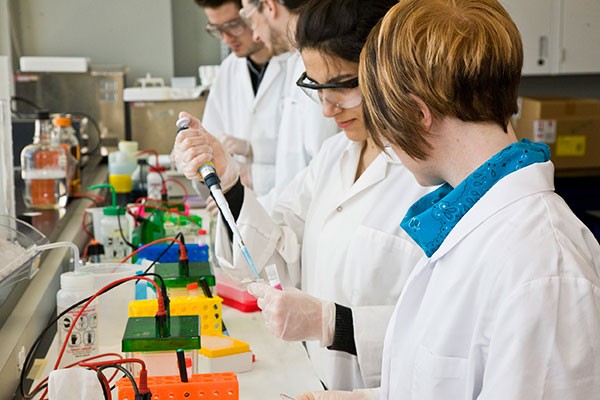Environmental, Health & Safety:
514-848-2424, ext. 4877
Biosafety program

Biohazards are defined as biological material that may potentially be harmful to humans, animals or plants.
Biohazardous materials include:
- Microorganisms such as viruses, fungi, parasites and bacteria;
- Microbial toxins;
- Mammalian primary tissues, blood and body fluids;
- Cell lines and other tissue culture;
- Certain types of nucleic acids, such as DNA derived from pathogenic organisms, human oncogenes.
Prior to conducting any new studies involving biohazards, a Biohazard Permit Application must be submitted to Environmental Health and Safety (EHS) for review and approval. EHS must also be advised if there are any significant changes (e.g., change in biological materials or procedures) to a previously approved permit.
For assistance in determining the required level of containment, please contact Environmental Health and Safety - EHS@concordia.ca (514-848-2424 ext. 4877).
For information on the biohazardous material, you may refer to the Pathogens Safety Datasheets available on Health Canada website. (scroll to bottom of Health Canada’s page to get the full list).
- Biosafety Policy (VPSS-52) and related document: Biosafety Committee Terms of Reference.
- Biosafety Manual
EHS must be notified at least 10 working days prior to the scheduled transfer to ensure transfer compliance.
In case of an international transfer, EHS will prepare and provide necessary paperwork to be used by Canada Border Services Agency, to avoid seizure and/or destruction of the biological material.
For assistance with the transfer of biological materials from or to Concordia University, please consult this document.
1-Fill the transfer form and contact EHS.
2–Consult the additional guidelines for biological products shipments:
National shipments (Canada only)
- Procedure For National Shipments of Category B Infectious Substances (No DRY ICE)
- Shipping Biological Goods in Canada
- Shipping Biological Goods on DRY ICE in Canada
- Packing Instructions for Special Provision A180
- Ground Shipment on Dry ICE in Canada
International shipments
For information on Concordia University’s Occupational Health Screening Programs, please refer to the programs webpage.
Autoclaves:
Biosafety Safety Cabinets:
- Biological Safety Cabinet Certification Procedure
- Procedure for Safe Use of a Biological Safety Cabinet
Centrifuges
Mixing Apparatus
Vaccum systems:
Purchases of oligos from vendors approved by EHS will now be allowed either through the issuance of a Purchase Order in Unity (Request a non-catalog item) or by P-Card, within any applicable transaction limits and monthly limits. Please contact EHS if you would like to buy from other vendors, the whole before any purchase is made. Other vendors would need to demonstrate their level sequence verification meets the requirements of the International Gene Synthesis Consortium. Should this demonstration be successful, the vendor will be added to the list of authorized vendors once verification is completed.
To this day, EHS has pre-approved the following vendors:
1. Aclid
2. Aldevron
3. Ansa Biotechnologies
4. Atum
5. Battelle
6. BGI
7. Bioneer Corp.
8. Blue Heron - Eurofins
9. Codex DNA
10. The DAMP Lab
11. DNA Script
12. Edinburgh Genome Foundry
13. Evonetix
14. GenScript
15. Ginkgo Bioworks
16. GP-Write
17. IDT Integrated DNA technologies
18. Nuclera
19. Raytheon BBN
20. Synplogen
21. Thermo Fisher Scientific
22. Twist Bioscience
Please contact EHS if you would like to buy from other vendors, the whole before any purchase is made. Other vendors would need to demonstrate their level sequence verification meets the requirements of the International Gene Synthesis Consortium. Should this demonstration be successful, the vendor will be added to the list of authorized vendors once verification is completed.
Pathogen Safety Data Sheets (PSDS) provide critical information on the hazards, risks, and safety precautions associated with handling specific pathogens. They guide laboratory personnel on routes of transmission, recommended biosafety levels, required personal protective equipment (PPE), decontamination procedures, and emergency response actions—supporting safe and informed laboratory practices. The Public Health Agency of Canada (PHAC) has developed a full list of PSDS. They are available as Pdf files on PHAC website . If you need assistance on retrieving a PSDS, or even need to update / create one, please contact the EHS office at ehs@concordia.ca.







